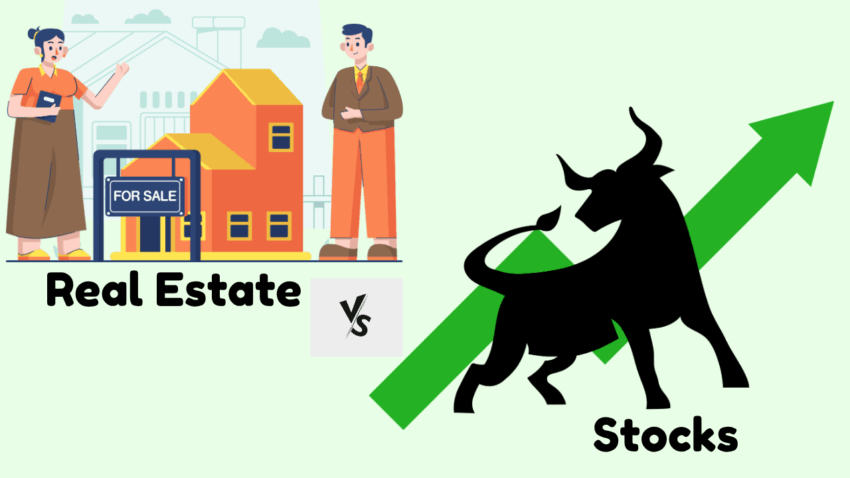Real Estate vs. Stocks: Which Is Better for Wealth Building?

In today’s fast-moving financial world, two of the most trusted ways to grow your money are real estate and stocks. Both have made people rich, but they work in very different ways. If you’re a middle-class earner looking to build wealth, understanding the pros and cons of both can help you make smart choices.
This article breaks everything down in simple terms. Whether you’re just starting or already investing, you’ll learn how both options can help you move toward financial success.
Understanding Real Estate as an Investment
Real estate involves buying properties like houses, apartments, or land to earn income or grow your investment. People love real estate because it is a physical asset. You can see it, touch it, and even live in it. Property values usually rise over time, and you can also earn rental income from tenants.
Real estate is also seen as a stable investment. It doesn’t swing up and down every day like stocks. But, it also takes more money to start and more work to manage. You may need a loan, do repairs, or handle tenants.
Pros of Real Estate:
- Tangible asset
- Rental income
- Long-term appreciation
- Tax benefits
Cons of Real Estate:
- Requires large initial investment
- High maintenance costs
- Not easily sold (low liquidity)
Real Estate Benefits
| Feature | Real Estate |
|---|---|
| Income Type | Rental & Appreciation |
| Starting Investment | High |
| Liquidity | Low |
| Risk Level | Medium |
| Time Involvement | High |
Understanding Stock Market Investments
The stock market lets you buy small parts of big companies, called shares. When the company makes money, so do you—either through higher share prices or dividends. Stocks are popular because you can start with very little money and trade them easily.
But stocks can be risky. Their prices go up and down quickly. This makes them exciting, but also scary for some. With the right knowledge and strategy, though, stocks can bring great returns over time.
Stocks are a great way to grow your money without much daily effort. You just need to be patient and stay in for the long run.
Pros of Stocks:
- Easy to start
- High liquidity
- Can be automated
- Great for long-term growth
Cons of Stocks:
- Can be very volatile
- Needs knowledge and patience
- Emotional ups and downs
Stock Investment Snapshot
| Feature | Stocks |
|---|---|
| Income Type | Dividends & Growth |
| Starting Investment | Low |
| Liquidity | High |
| Risk Level | High |
| Time Involvement | Low to Medium |
Comparing Returns: Real Estate vs. Stocks
Returns from real estate often come from two things: property value increase and monthly rental income. You can earn 8%–12% per year if you manage your property well. But these returns depend on the location and market.
Stocks, on the other hand, have historically returned around 10% per year on average (for the S&P 500 index). If you reinvest your earnings, your wealth grows even faster due to compound interest.
So, both options can give strong returns—but stocks may grow faster if you stay invested for the long term.
Average Annual Returns
| Investment Type | Average Return (10 years) | Volatility |
|---|---|---|
| Real Estate | 8–12% (incl. rental) | Low-Medium |
| Stocks | 10–12% | High |
How to Choose What’s Right for You
If you love managing property, dealing with tenants, or flipping houses, real estate may be better for you. It also works well for people who want regular rental income or own homes in fast-growing cities.
If you want something more hands-off and long-term, stocks are perfect. You can invest from your phone, start with a small amount, and let it grow slowly.
Many experts suggest doing both. You can own real estate and still put some money into stocks for balance.
Tips to Choose:
- Think about how much time you have.
- How much can you invest now?
- Do you want fast access to your money?
- Are you okay with risks?
Costs and Effort Involved
Real estate comes with many hidden costs. You’ll have to pay for taxes, repairs, insurance, property management, and sometimes legal help. It takes time and effort to keep the property in good shape.
Stocks, in comparison, need very little effort after investing. The biggest cost is the emotional stress when the market falls. You also pay small fees or taxes, but these are usually very low.
Understanding these costs helps you avoid surprises and plan your strategy better.
Real Estate vs. Stock Costs
| Cost Type | Real Estate | Stocks |
|---|---|---|
| Entry Costs | High | Low |
| Maintenance | High | None |
| Management | Often Needed | Not Required |
| Transaction Fees | High | Low or None |
Tax Benefits and Drawbacks
Real estate offers great tax benefits. You can deduct mortgage interest, property taxes, and even depreciation. This can reduce your overall tax bill each year.
Stocks have fewer tax benefits unless you invest through tax-advantaged accounts like a retirement plan. You pay taxes on gains when you sell, and on dividends if they’re not reinvested.
Taxes play a big role in wealth building. Choose the path that helps you save more in the long run.
Quick Tax Points:
- Real estate gives more write-offs.
- Stocks in retirement accounts can grow tax-free.
- Selling property = capital gains tax (unless reinvested).
- Long-term stock gains are taxed less than short-term ones.
Real Estate for Long-Term Growth
Over 10–20 years, real estate can create solid long-term wealth. It grows slowly, but steadily. Rental income gives a reliable monthly cash flow. And if the property is in a good area, it increases in value over time.
You can also use leverage, which means using other people’s money (like a loan) to buy bigger properties. This helps you earn more from less upfront money.
Still, don’t ignore the risks. Property values can fall, tenants may leave, and repairs can cost a lot.
Stocks for Long-Term Growth
With stocks, the longer you stay invested, the more money you make. Compounding works best over time. Even if the market goes down some years, it usually rises over the long term.
Investing in index funds or mutual funds is a simple way to grow your money without choosing individual stocks. This helps you spread your risk.
One of the best parts of stock investing is flexibility. You can buy or sell anytime. This is great for middle-class earners who want freedom.
The Role of Passive Income in Both
Real estate gives passive income through rent. Once your mortgage is paid off, that rent becomes your profit. You can also earn passively by hiring someone to manage the property.
Stocks also give passive income through dividends. Some companies pay you part of their profit regularly. Reinvesting these helps your investment grow faster.
In both cases, passive income helps you work less and earn more.
Financial Independence and Middle-Class Investors
Most people believe that only rich people can invest. That’s not true. Middle-class families can also grow their money by starting small and staying consistent. Steps like budgeting, saving early, and avoiding debt make a huge difference.
A smart financial plan over 10 or 20 years can turn small monthly savings into a strong portfolio. By using tools like SIPs, dividend reinvestment, and real estate, middle-class families can steadily grow their income.
For those serious about building wealth, combining passive income with long-term investments can lead to true freedom. Yes, building wealth make1m.com millionaire life isn’t a fantasy — it’s a real goal if you stay consistent, avoid debt, and keep learning.
Which One Is Right for You : Real Estate vs. Stock
| Feature | Real Estate | Stocks |
|---|---|---|
| Starting Investment | High | Low |
| Time Required | High | Low |
| Liquidity | Low | High |
| Tax Benefits | Many | Limited |
| Risk Level | Medium | High |
| Returns | Moderate-High | High (long term) |
| Suitable For | Active investors | Passive investors |
Final Thoughts
You don’t have to choose one or the other. Real estate and stocks can work well together. For example, use rental income to buy more stocks. Or use stock profits to invest in property.
Diversifying your investments makes your future safer. If one market is down, the other can still grow. This protects your money and helps you reach your wealth goals.
The best path to wealth building is the one that fits your lifestyle, income, and long-term goals. Whether it’s real estate, stocks, or both—just start and stay committed.



Leave a Reply
You must be logged in to post a comment.